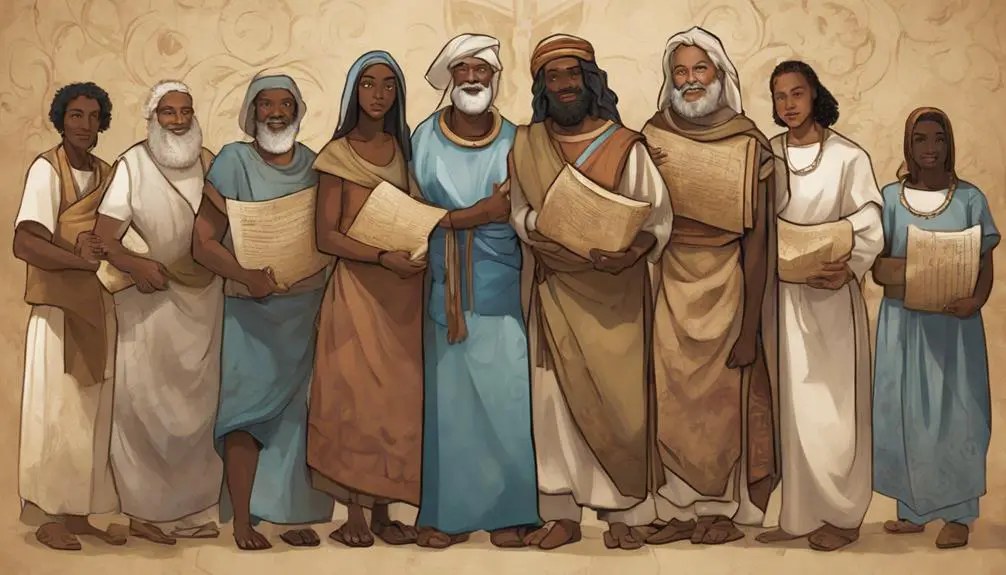From harsh servitude to benign service, explore the complex roles of bond servants in the Bible and their impact on modern perspectives.

Bond Servants in the Bible
Have you ever wondered how bond servants are portrayed in the Bible? You're not alone.
The concept of servitude during biblical times is complex, encompassing a wide range of conditions, from harsh servitude to more benign forms of service.
As you explore the historical context and the specific laws governing bond servants, you'll uncover how these roles were integral to society and how they're interpreted in religious and ethical discussions today.
By examining the rights, protections, and notable figures among bond servants, you'll gain insight into a part of biblical history that continues to influence contemporary views on service and freedom.
This journey might surprise you with its relevance and the depth of understanding it offers.
Key Takeaways
- Biblical laws offered bond servants protection and rights, including Sabbath rest and release conditions.
- Economic hardships often led individuals to voluntarily enter servitude as a means of survival.
- Servant narratives in the Bible, such as Joseph and Jochebed, highlight themes of leadership, sacrifice, and divine providence.
- Understanding biblical servitude provides insight into contemporary issues of labor rights and human dignity.
Historical Context of Bondage

To understand the role of bond servants in the Bible, it's crucial to delve into the historical context of bondage, which was deeply intertwined with the economic, social, and legal structures of ancient societies. You'll find that economic factors played a significant role in the establishment and perpetuation of servitude. In times of famine, war, or debt, individuals often found themselves with no other option but to become bond servants as a means to survive. This arrangement wasn't only a reflection of personal misfortune but also a testament to the economic vulnerabilities that plagued ancient communities.
Moreover, the social hierarchy of these societies was closely linked to this system of bondage. Being a bond servant positioned an individual at a lower stratum of society, yet it was a recognized and regulated status. This stratification underscored the disparities in power and privilege, delineating clear lines between the free and the bonded. However, it's important to note that the bond servant's role was nuanced, varying significantly across different cultures and periods within the biblical world.
In analyzing the historical context of bondage, you're diving into a complex interplay of economic desperation and social stratification. These elements collectively shaped the lives of bond servants, influencing their opportunities, rights, and the nature of their servitude. Understanding this backdrop is essential for comprehensively grasping the multifaceted roles that bond servants held in biblical narratives and the societies they inhabited. This exploration sheds light on the profound impact economic factors and social hierarchy had on the institution of bondage, offering a nuanced perspective on its function and significance in ancient times.
Biblical Laws on Servitude

Having explored the historical context of bondage, we now examine the biblical laws on servitude, which offered a structured framework for this practice within ancient societies. These laws provided guidelines on how servitude was to be conducted, ensuring some level of protection and rights for bond servants. Let's delve into the specifics:
- Debt reasons: One primary reason for entering into servitude, as outlined in the Bible, was debt. Individuals who couldn't repay their debts found themselves or their family members in servitude as a means to fulfill their financial obligations. This practice was regulated to prevent perpetual bondage for the debtor or their descendants.
- Release rituals: The biblical laws also mandated specific rituals and conditions under which a servant could be released. These release rituals were significant, as they provided a structured method for ending one's period of servitude, often coinciding with jubilee years or after a set period, such as six years of service. This ensured that servitude wasn't an endless plight but had a foreseeable conclusion.
- Rights and protections: Despite the nature of servitude, the Bible allocated certain rights and protections to servants. This included provisions for rest, fair treatment, and the right to a life beyond servitude after fulfilling the terms of their service. These laws aimed to humanize the practice, differentiating it from more oppressive forms of bondage.
Analyzing these aspects, it's clear that biblical laws on servitude were designed to regulate and mitigate the impact of this practice within society, balancing the economic realities of ancient life with moral and ethical considerations.
Types of Bond Servants

While exploring the dynamics of servitude within biblical contexts, it's crucial to distinguish between the various types of bond servants described in the scriptures. The Bible presents a nuanced portrayal of servitude, shaped significantly by cultural influences and the socioeconomic conditions of the time.
One of the primary distinctions you'll encounter is between those who entered servitude through voluntary commitments and those who found themselves in bondage due to debt or conquest. Voluntary servitude often arose from economic necessity, where individuals chose to become bond servants to avoid poverty or destitution. This decision was deeply influenced by the cultural norms of the era, which viewed such arrangements as acceptable means of securing one's livelihood.
On the other hand, involuntary servitude was typically a consequence of debt or warfare. Individuals who couldn't repay their debts might become bond servants to their creditors, while captives of war were frequently reduced to servitude. These scenarios reflect the harsher realities of ancient societies, where personal freedom could be compromised by external circumstances.
Moreover, the distinction between Hebrew and non-Hebrew servants highlights the cultural influences on servitude practices. Hebrew bond servants were often treated differently, with laws in place that provided for their release after a set period. This differentiation underscores the impact of cultural identity on the treatment and perception of bond servants.
Understanding these types of bond servants sheds light on the complex interplay of personal choice, economic conditions, and cultural norms governing servitude in biblical times. It's a testament to the multifaceted nature of human societies, where practices such as servitude were shaped by a myriad of factors.
Rights and Protections

Amid the complexities of biblical servitude, the rights and protections afforded to bond servants present a noteworthy aspect of ancient legal and moral frameworks. These provisions offer a compelling lens through which to examine both historical practices and their modern parallels, sparking ethical debates that resonate to this day.
Here are three key rights and protections that were typically granted to bond servants in biblical times:
- Sabbath Rest: Bond servants were entitled to rest on the Sabbath, reflecting a universal need for rest and dignity regardless of one's social status.
- Release after a Set Period: Many bond servants had the right to be released after a predetermined period, usually six years, highlighting an early recognition of personal freedom.
- Protection Against Abuse: Legal codes in the Bible mandated fair treatment of bond servants, prohibiting physical abuse and ensuring their well-being, a principle that underpins modern human rights laws.
These ancient stipulations prompt reflection on the evolution of labor laws and workers' rights, illustrating a historical continuum that informs our understanding of ethical labor practices today. The discussion of rights and protections for bond servants in the Bible isn't just a historical curiosity; it's a foundation for ongoing ethical debates about labor, dignity, and human rights.
As you navigate these discussions, it's crucial to approach them with an analytical and informed perspective, recognizing the historical context while exploring the implications for modern society. The parallels between biblical servitude and contemporary labor issues underscore the enduring relevance of these ancient texts in shaping our moral and ethical frameworks.
Prominent Servants in Scripture

Exploring the rights and protections of bond servants in biblical times leads us naturally to consider the lives of specific individuals who served in such roles, shedding light on the human aspects behind these ancient laws. The narratives of such individuals aren't just historical footnotes; they're integral to understanding the cultural and religious fabric of the time.
Take, for instance, the story of Joseph, sold into slavery by his brothers, yet rising to become the second most powerful man in Egypt. His journey exemplifies servant leadership, showcasing how perseverance, faith, and humility can transform adversity into opportunity. Joseph's story transcends personal redemption, symbolizing the potential for societal reconciliation and the breaking of cycles of envy and violence.
Then there's the tale of Moses' mother, Jochebed, a Hebrew woman who, in a desperate attempt to save her son, placed him in a basket on the Nile. Serving in the humblest capacity as a mother, her actions speak to the sacrificial aspect of service, her faith laying the foundation for Moses' future leadership of the Israelites out of bondage.
These narratives, and others like them, are steeped in cultural symbolism, reflecting the values and hopes of their times. They teach us about the dignity found in serving, regardless of one's social or economic status, and challenge us to see servant leadership not as a sign of weakness but as a testament to strength and character.
Understanding these stories helps you grasp the complex interplay between individual agency and divine providence in biblical literature, highlighting the timeless relevance of these ancient texts.
Interpretations and Reflections

Delving into these stories offers a lens through which we can examine the deeper meanings and implications of servitude in the biblical context, inviting you to reflect on the intersection of faith, morality, and human resilience. As you navigate through these narratives, it's crucial to consider how they resonate with our contemporary experiences and the ethical dilemmas they present.
Here are three key points to ponder:
- Modern Parallels: You can't help but notice the striking similarities between biblical servitude and modern-day issues of labor and human rights. This connection prompts you to question how far society has come and what lessons remain unlearned.
- Ethical Dilemmas: The stories of bond servants in the Bible are rife with moral complexities. You're compelled to reflect on the ethical considerations surrounding freedom, ownership, and the inherent value of a person. How do these ancient texts challenge or reinforce your moral compass?
- Human Resilience: Despite the harsh realities faced by many biblical figures, their stories are often marked by a remarkable spirit of resilience. This aspect invites you to appreciate the strength and endurance of the human spirit, encouraging a deeper empathy for those enduring servitude in any form today.
As you ponder these points, it's evident that the biblical narratives of servitude aren't just historical accounts but are imbued with timeless relevance. They challenge you to engage critically with the past and its echoes in the present, offering a rich tapestry of lessons on faith, ethics, and the enduring human capacity for resilience and hope.
Frequently Asked Questions
How Did the Practice of Bond Servitude in the Bible Compare to Slavery in Other Ancient Civilizations, Like Rome or Egypt?
When you compare ancient servitude practices, you'll notice distinct differences in servant treatment and cultural perceptions between civilizations like Rome or Egypt and others.
While some societies viewed servitude more as a form of economic necessity, others embedded it deeply within their social and legal structures, often with harsher conditions.
Understanding these nuances reveals not just variations in practice but also the complex ways cultures have historically justified and managed servitude.
Are There Any Documented Instances or Archaeological Evidence of Bond Servants in Biblical Times Outside of the Scriptural Texts?
You're diving into history's treasure chest, seeking evidence of bond servants beyond ancient texts. Indeed, servant inscriptions and artifacts serve as tangible links to their existence.
Digging into this era, you'll find debt laws intricately connected to servitude, painting a complex societal picture.
While challenging, archaeological findings and inscriptions offer a silent testimony, shedding light on the lives and statuses of those bound by debt in a time long passed.
How Has the Concept of Bond Servitude in the Bible Influenced Modern Legal Systems or Social Structures, if at All?
The concept of bond servitude has intricately influenced modern legal systems and social structures. Through servant legislation, principles once governing bond servants have morphed into laws affecting employment and contract relations today.
This social evolution reflects a transition from ancient practices to contemporary norms. While the direct lineage mightn't always be clear, the foundational ideas of obligations and rights remain embedded in the fabric of modern societal and legal frameworks.
Can the Economic Impacts of Bond Servitude on Ancient Israelite Society Be Quantified or Compared to Its Impacts on Other Societies in the Same Era?
You're exploring if you can quantify the economic impacts of bond servitude on ancient societies, specifically focusing on agricultural productivity and urban development.
When comparing these impacts across different societies of the same era, it's crucial to analyze available data and historical records impartially.
While challenging, this analysis can reveal how bond servitude influenced economies, potentially affecting both agricultural outputs and the growth or decline of urban areas in those ancient societies.
How Do Contemporary Religious Scholars Reconcile the Ethical Dilemmas Surrounding Bond Servitude as Presented in the Bible With Modern Views on Human Rights and Freedom?
You might wonder how experts tackle the ethical questions raised by historical practices when viewed through today's human rights lens.
They delve into moral justification, examining ancient texts and their modern interpretations. This approach helps reconcile differing viewpoints, offering a nuanced understanding of historical contexts versus contemporary values.
Conclusion
In exploring the nuanced tapestry of servitude within biblical texts, you've journeyed through ancient norms to the heart of spiritual and societal ethics. Like Daniel in the lions' den, bond servants navigated the confines of their roles with resilience.
This analysis reveals not only the complexities of their existence but also mirrors broader human quests for dignity and freedom. By delving into these ancient narratives, you're reminded that the quest for understanding and compassion is as timeless as the scriptures themselves.



Sign up